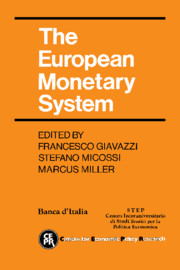Book contents
- Frontmatter
- Contents
- List of figures
- List of tables
- Preface
- Conference participants
- 1 Introduction
- I THE INTERNATIONAL ENVIRONMENT
- II DISINFLATION, EXTERNAL ADJUSTMENT AND COOPERATION
- 3 Monetary discipline and cooperation in the European Monetary System: a synthesis
- 4 The role of the exchange-rate regime in a disinflation: empirical evidence on the European Monetary System
- 5 Inflation and the European Monetary System
- 6 Economic growth and exchange rates in the European Monetary System: their trade effects in a changing external environment
- III EXCHANGE RATES, CAPITAL MOBILITY AND MONETARY COORDINATION
- IV THE FUTURE OF THE EUROPEAN MONETARY SYSTEM
- Index
3 - Monetary discipline and cooperation in the European Monetary System: a synthesis
Published online by Cambridge University Press: 12 March 2010
- Frontmatter
- Contents
- List of figures
- List of tables
- Preface
- Conference participants
- 1 Introduction
- I THE INTERNATIONAL ENVIRONMENT
- II DISINFLATION, EXTERNAL ADJUSTMENT AND COOPERATION
- 3 Monetary discipline and cooperation in the European Monetary System: a synthesis
- 4 The role of the exchange-rate regime in a disinflation: empirical evidence on the European Monetary System
- 5 Inflation and the European Monetary System
- 6 Economic growth and exchange rates in the European Monetary System: their trade effects in a changing external environment
- III EXCHANGE RATES, CAPITAL MOBILITY AND MONETARY COORDINATION
- IV THE FUTURE OF THE EUROPEAN MONETARY SYSTEM
- Index
Summary
Efforts to understand the European Monetary System (EMS) as a strategic game sometimes emphasise monetary discipline, sometimes the gains of exchange-rate cooperation. This study attempts to combine the two approaches in order to benefit from the respective merits of each. The monetary discipline hypothesis is especially helpful in understanding the interest of the inflation-prone members in the system, while the issue of strategic cooperation is essential in explaining the German presence. The German benefits are also more secure than those to the rest. The argument further implies that tighter monetary policy will result in the EMS not only from the behaviour of the others, but from that of Germany itself.
The first part of the study will be devoted to the proposition that neither cooperation nor monetary discipline alone provides an adequate basis for the EMS. The second part will contain the proposed theoretical framework for analysing monetary discipline, in which we will admit cooperation later on in the third part. The cooperative element, in this next part, will revolve around the competitiveness of traded goods. A short concluding section will follow.
The shortcomings of either cooperation or monetary discipline as the sole basis for the EMS
Standard application of game theory shows that the EMS can benefit everybody by avoiding competitive exchange-rate appreciation or depreciation. The cooperative interpretation of the EMS has two empirical drawbacks, however. In the first place, it cannot explain the dominant position of Germany.
- Type
- Chapter
- Information
- The European Monetary System , pp. 51 - 84Publisher: Cambridge University PressPrint publication year: 1988
- 25
- Cited by



